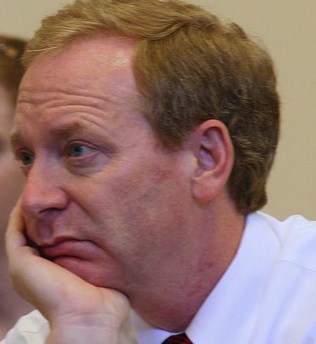Sting of Press Coverage Spurs Microsoft To Issue Free Software Licenses
SAN FRANCISCO, Sept. 13, 2010 — Microsoft on Monday reacted swiftly to a New York Times report that law enforcement authorities are abusing the company’s anti-piracy campaign to squelch dissent by unilaterally issuing free licenses to non-profits operating around the world.

"Whatever the circumstances of the particular cases the New York Times described, we want to be clear that we unequivocally abhor any attempt to leverage intellectual property rights to stifle political advocacy or pursue improper persoanl gain," said Brad Smith, Microsoft's general counsel Monday.
SAN FRANCISCO, Sept. 13, 2010 — Microsoft on Monday reacted swiftly to a New York Times report that law enforcement authorities are abusing the company’s anti-piracy campaign to squelch dissent by unilaterally issuing free licenses to non-profits operating around the world.
“Whatever the circumstances of the particular cases the New York Times described, we want to be clear that we unequivocally abhor any attempt to leverage intellectual property rights to stifle political advocacy or pursue improper personal gain,” wrote Brad Smith, Microsoft’s general counsel on the company’s official blog on Monday morning.
Smith’s reaction on Monday came after the Times reported that the law enforcement authorities in Russia had been abusing Microsoft’s anti-piracy campaign for some time to squelch dissidents. The Times also reported that the dissidents and news outlets had appealed to Microsoft for help, but had received none.
Smith acted to reverse that situation Monday by issuing the free licenses, and hiring lawyers to conduct an investigation into the situation. He wrote that Microsoft is also consulting human rights organizations for advice, although he didn’t name any.
Microsoft has been donating more than $390 million worth of software to more than 42,000 non-profits around the world, Smith noted on Microsoft’s blog, but many non-profits don’t know about the program, or don’t know how to navigate a complicated process to obtain the software.
“We’ll solve this problem by providing a unilateral NGO software license that runs automatically from Microsoft to NGOs and covers the software already installed on their PCs,” Smith explained on the blog. “We’ll make this new, non-transferable license applicable to NGOs in a number of countries, including Russia.”
He added that Microsoft would also make those licenses available to “appropriate journalists’ organizations in order to include small newspapers and independent media.”
Microsoft is taking a number of other long-term steps to prevent the abuse of its anti-piracy campaign by creating a legal assistance program for the non-profits, but the immediate goal is to “exonerate” any qualifying group, he wrote.
Photo courtesy of Doc Searls.








Member discussion